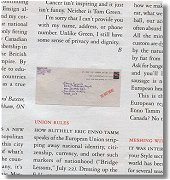A CBC “Off the Beaten Track” episode in which I talk about Showboat and the history of the song Old Man River. Originally aired on August 20, 2000 on CBC Radio’s Mainstreet program in Prince Edward Island.
Ol’ Man River
Introduction: A brief history of the song “Ol’ Man River,” along with two very different interpretations by Canadian artists Curtis Driedger and Jane Siberry.
Show Boat
- In 1926, a book called “Show Boat” by Edna Ferber was published – she was born in Kalamazoo, Michigan who had won the Pulitzer Prize in 1924 for her book So Big.
- Show Boat follows the life of Magnolia, daughter of the captain of the riverboat The Cotton Blossom.
- Magnolia marries a gambler, Gaylord Ravenal.
- As a result of his gambling, they separate
- Magnolia moves to Chicago where she takes up life in musical comedy.
- Their daughter follows her mother into show business, and eventually Magnolia and Gaylord are reunited years later at a performance of their now internationally famous daughter.
- Woven throughout this plot is the sub-plot concerning the lives of the black workers on the riverboats, and marriage of Magnolia’s best friend Julie La Verne and her husband, which runs afoul of the law because it is discovered that Julie is of mixed black and white heritage, and this is against the law.
- In 1927, collaborators Jerome Kern and Oscar Hammerstein II adapted the book into a Broadway show.
- Show Boat the musical was groundbreaking when it premiered in 1927, as musicals up to that point hadn’t had a coherent plot or songs tied to the action.
- Show Boat is said in many circles to mark the beginning of American musical theatre.
- Show Boat originally played Broadway in 1927, was adapted into a movie in 1936 and again in 1951, and was revived on Broadway in 1946, and several times thereafter, most famously in recent years in 1994 by Garth Drabinsky.
Ol’ Man River
- The song Ol’ Man River is sung by Joe, one of the riverboat workers, several times throughout the musical.
- Edna Ferber said in her autobiography: “…Jerome Kern appeared at my apartment late one afternoon with a strange look of quiet exultation in his eyes. He sat down at the piano. He didn’t play the piano particularly well and his singing voice, though true, was negligible. He played and sang ‘Ol’ Man River.’ The music mounted, mounted, and I give you my word my hair stood on end, the tears came to my eyes, I breathed like a heroine in a melodrama. This was great music. This was music that would outlast Jerome Kern’s day and mine. I have never heard it since without that emotional surge. When SHOW BOAT was revived at the Casino Theater in New York just four years after its original production at the Ziegfeld I saw a New York first-night audience, after Paul Robeson’s singing of ‘Ol’ Man River,’ shout and cheer and behave generally as I’ve never seen an audience behave in any theater in all my years of playgoing…”
- The song is most closely associated with Paul Robeson, who played Joe in the Broadway production of Show Boat and in the 1936 movie.
- In the original 1927 lyrics, it’s written:
I gits weary and sick of tryin’;
I’m tired of livin’ and scared of dyin’
And Ol’ man river, he just keeps rollin’ along.
- Robeson later revised the lyrics to:
I keeps laffin’ instead of cryin’
I must keep fightin’ until I’m dyin’
And Ol’ man river, he just keeps rollin’ along.
- Roberson, who had been a football star and then an actor, went on to a life as a political activist.
Canadian Singers on Ol’ Man River
- Back on June 1, 1990, I was program director at Trent Radio, a community radio station in Peterborough, Ontario.
- We organized an evening of performances by local musicians at the Market Hall in downtown Peterborough.
- One of the performers was Curtis Driedger, formerly of the infamous Toronto band the CeeDees.
- Here’s some of his performance from that night, recorded live and originally broadcast on Trent Radio…
[clip from “Curtis Dreidger live at Artspace”, recorded June 1, 1990; on cassette tape, queued]
- Toronto singer/songwriter Jane Siberry, who has, in recent years, been running her musical career largely through her own Sheeba Records website – www.sheeba.ca — is about to release an album of Celtic and American spirituals called “Hush.”
- From that album, here is her own rendition of “Ol’ Man River,” which you will immediately see is quite different from Curtis’
[clip from “Hush” by Jane Siberry, track 9]
 Way back in May when we visited New York City for the New Yorker Festival, I visited
Way back in May when we visited New York City for the New Yorker Festival, I visited 



